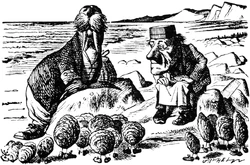 |
| A scene from the greatest oyster- related crime in history. |
Ultimately, nobody knows, but every once in a while somebody takes a shot at an estimate.
The latest such official guess on the number of Texas felonies comes from the Texas Legislative Council, best known for being the official drafters of bill language during Texas legislative sessions. They've produced their first report in five years to count the number of felonies in all of Texas law and compile an "inventory."
They came up with an estimate of 749 different felonies on the books statewide.
By contrast, the Board of Pardons and Paroles has an "Offense Severity" list - which they use to assign risk levels to potential parolees - that counts well over 2,500 felonies. Here's the current iteration.
Our pal Marc Levin from the Texas Public Policy Foundation a few years ago counted around 1,700 felonies in various codes, somewhat splitting the difference.
Why are there so many estimates?
Because what counts as a separate crime may depend on the eye of the holder, and distinctions are inevitably subsumed within whatever (inevitably somewhat arbitrary) nomenclature and categorizations which drive the analysis.
To think about this, let's consider oyster-related felonies. A few years ago, Politifact fact-checked a statement I'd made that there were eleven felonies in Texas you could commit with an oyster. They rated it "Mostly True," commenting, "He could have said 16." But three of them appeared to be duplicates, so the reporter estimated 13. Politifact also found a lawyer from the Parks and Wildlife Department who said there were, broadly, seven distinct oyster felonies.
(For more background, see, "Oyster-related crime and its absurdist consequences.")
Which leads us to ask, how many felonies can Texans commit with an oyster under the TLC's nomenclature? A measly 3!
What's going on? Has Texas suddenly gone soft on crustacean-related crime? How will the state respond to the threat of felonious bivalve behavior rising like a tide upon our shores? Will Texans soon find ourselves overrun by malicious mollusks, wicked whelks, or calumnious clams? Perhaps the Governor should respond with a DPS "surge" along the beaches on the Gulf?
Fear not! Two of the TLC's oyster categories are "certain oyster license offenses," and thus subsume multiple different violations which were spelled out in more detail in the other counts.
Indeed, when we speak of "license" violations, that gets us to the criminalization of regulatory violations, which are more common in the federal system but also something that occurs under Texas law.
Some of what's going on here may be explained by Texas' historical antipathy to business regulation. Nobody in the Legislature wants to create new government agencies or responsibilities, much less fund enforcement. So when business practices arise that they dislike, Texas legislators typically react by passing a criminal law that punishes business violators with the same sanctions faced by people who rape or rob.
Whether there are eleven felonies Texans can commit with an oyster ... Or sixteen. Or thirteen. Or seven. Or three ... matters less than the fact that there probably shouldn't be nearly so many criminal penalties related to shellfish at all.
District Attorneys aren't the right people to be prosecuting regulatory violations, so often they don't get prosecuted at all until somebody gets seriously hurt, which is pretty much the opposite of what prioritizing public safety should look like.
One of the criticisms of creating a civil penalty for low-level marijuana possession during the 2017 session was that Texas doesn't have civil penalties for anything, including license violations related to oyster harvesting. But to me, the substance of that criticism doesn't argue against a civil penalty for pot, but instead for reviewing how criminal law is used in Texas as a third-rate substitute for business regulation.
Regardless, the fact that well-intentioned, highly informed people come up with such widely disparate estimates on the number of felonies tells you there are literally, at this point, too many to count.
If you have ever wondered why the number of people prosecuted in the 21st century continued to rise long after crime declined in Texas, this proliferation of misplaced criminal laws is a contributing factor.


.jpg)
9 comments:
Is it libel to call a molusk a crustacean?
Possibly = "fighting words." :)
Attack of the killer oysters.
Why don't y'all clam up!
P.S. Shuck you Grits!
We shell not be silenced, 8:16!
Clam Lives Matter
Oy!!! Stirr-ing the pot, again, are we??
Is it possible for a legislator to legislate without making, passing, enacting, or formulating laws? If all is well and nothing needs doing, what does a legislator do to shine and get reelected?
Well, sitting at home collecting a check seems awfully shellfish... But then again working too hard they might pull a mussel
Post a Comment